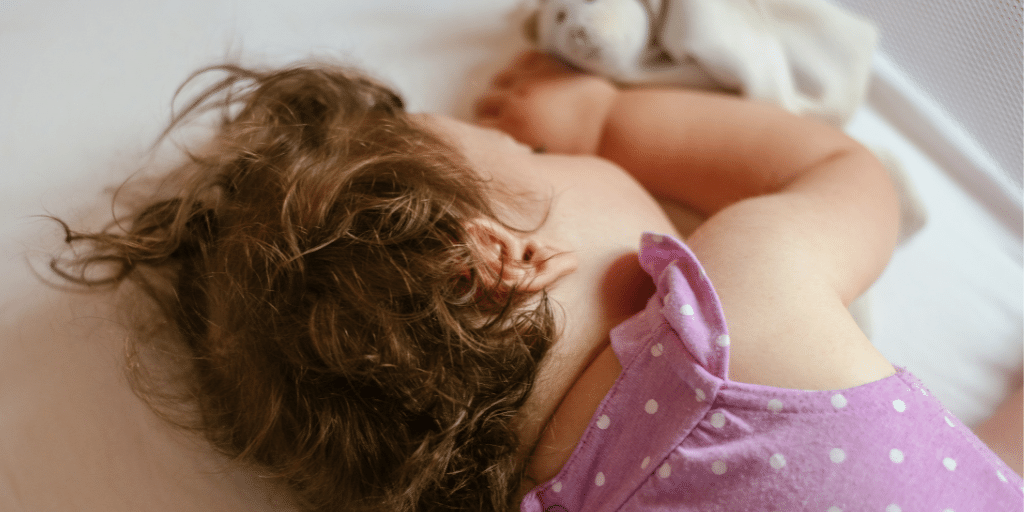Sleep regression is a dreaded stage when your baby’s (hopefully) good sleep patterns suddenly get worse for a short period of time. You can read more about what sleep regression is here.
Your baby may experience several periods of sleep regression in their first two years. It can hit at four, eight and twelve months, at 18 months and again at two years. Remember that all babies are different and that these times scales are just a guide.
Four-Month Sleep Regression
One of the worst sleep regressions, the four-month regression comes at a time when major changes are happening to your baby, including some big physical changes. It usually lasts for around five weeks and you’ll find that your baby is fussy and harder to get to sleep.
You may have just got to grips with a sleep routine and this will disrupt it. Many baby sleep experts advise you to do whatever you need to do to survive, which may mean reverting to rocking your baby to sleep when you’d managed to stop this. White noise can also be a great way to soothe a fussy baby.
Do not cut down on daytime naps in the hope that your baby will sleep through the night. At four months, your baby should get between 12 and 15 hours of sleep a day. If napping out and about is part of your routine, use SnoozeShade to give your baby a dark environment with no distractions.
Eight-Month Sleep Regression
There are a couple of big changes that cause the eight-month sleep regression. For one thing, your baby is now much more active, rolling over, crawling and maybe even pulling themselves up and cruising around the furniture and this activity can cause problems at bedtime if they want to stand up in the cot or roll around it. The other big change is in their emotional development, when they become aware that you sometimes leave the room, or leave them with a childminder or at nursery. Welcome to separation anxiety! Your baby doesn’t yet understand that if you go away, you will come back again, so they need to learn this. Play fun games like Peek a Boo and talk to them as you leave a room, so that they can still hear you. It can also be helpful for your baby to see you if they wake during the night, to reassure them that you’re still there – keep your actions to a gentle pat and a few words, resisting the temptation to pick your baby up. You might even be able to soothe them by using the talk back function on a baby monitor to avoid unnecessary disturbance.

12-month Sleep Regression
Being a year old is an exciting time and now your little one has started to walk and talk, it’s no wonder they don’t want to waste time on sleep. The 12-month regression generally lasts for about two weeks. Luckily, your baby’s new physical skills mean that you can do lots of physical activity to really tire them out. Perhaps you could also drop to one nap a day, aiming for a total of between 11-14 hours of sleep in a 24-hour period. During this regression, and in future ones it’s best to avoid picking up your baby to rock them to sleep, as at this age it really won’t help to develop their independence and ability to self-settle.
18-month Sleep Regression
The 18-month regression will often be linked to new teeth (your baby’s canines will be appearing around now), as well as separation anxiety and increased cognitive development. As their second year approaches, your little one may also be having tantrums – they become frustrated at things they can’t yet do. To get through this, stick to your bedtime routine and try not to offer extra naps in the daytime to make up for lack of sleep in the night. You can also start to offer them the opportunity to get involved in decisions, so they feel like they have some control – allow them to choose between two different outfits, or pick the book to read at bedtime.
Two-Year Sleep Regression
By now, your little one is a real person with lots going on in their young lives – moving from a cot to a bed, potty training, nursery and play groups. Add to this that their molar teeth are erupting, they are still having tantrums and you’ve got some pretty big issues to contend with. This sleep regression can last from two to six weeks but you’ll be able to deal with this one better and hopefully, it’s that last one you’ll have to contend with.
We hope you’re feeling better about getting through phases of broken sleep, disturbed nights and frustration. Just remember, they don’t last forever and it will soon be a memory!
Further Reading:
How Does Teething Lead to Sleep RegressionFive Reasons Why You Baby Wakes at Night
Three Baby Sleep Problems and How to Fix Them




